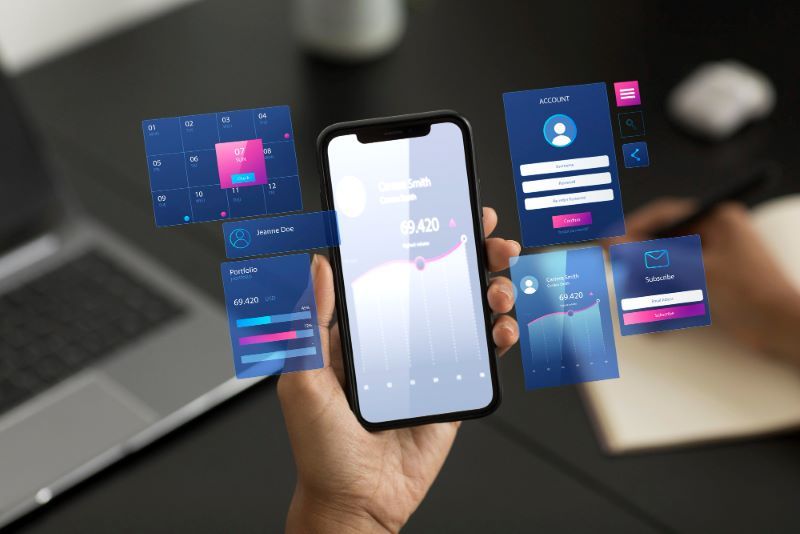In today’s fast-paced, tech-driven world, businesses are continually looking for innovative ways to stay ahead of the competition. Enterprise mobile app development has emerged as one of the most powerful tools for companies to streamline operations, enhance employee productivity, and improve customer engagement. As the demand for mobile solutions rises, enterprises are turning to customized mobile apps to address their unique challenges and opportunities.
This blog explores why enterprise mobile app development has become a game-changer for businesses, the key considerations when developing an enterprise app, and how to leverage this technology to drive long-term success.
Why Enterprise Mobile App Development is Critical in 2025
The mobile app industry is booming, with enterprise apps gaining a significant share of the market. But why is this trend accelerating?
- Improved Efficiency:
Enterprise mobile apps are tailored to streamline complex workflows. From task management to real-time communication, these apps reduce bottlenecks and save valuable time. - Enhanced Data Accessibility:
With an enterprise app, employees can access critical business data on the go. Whether they’re in the office or out in the field, this accessibility boosts decision-making and agility. - Scalability for Growing Businesses:
Unlike generic apps, enterprise mobile apps are built to scale with your business needs. As your team expands or processes become more complex, these apps adapt without compromising functionality. - Heightened Security:
Security is paramount for any business. Enterprise apps come equipped with advanced security features such as encryption, multi-factor authentication, and regular updates, ensuring that sensitive data remains safe.
Key Features of a Successful Enterprise Mobile App
When embarking on an enterprise mobile app development project, certain features are non-negotiable for success.
- User-Friendly Design:
A clutter-free, intuitive interface ensures that employees and clients can use the app effectively without extensive training. - Cross-Platform Compatibility:
The app should work seamlessly across different platforms like iOS, Android, and web browsers to accommodate diverse user preferences. - Integration with Existing Systems:
Enterprise apps need to integrate with other tools like CRMs, ERPs, and analytics platforms to provide a unified experience. - Offline Functionality:
Employees working in areas with poor connectivity still need access to essential features. Offline functionality ensures productivity isn’t hampered. - Customizable Dashboards and Reports:
Personalized dashboards help users focus on what’s relevant to them, while real-time analytics and reporting empower decision-makers.
The Development Process: Step-by-Step Guide
To create a successful enterprise app, you need a structured approach. Here’s a step-by-step guide to streamline your development process.
- Identify Business Goals and Challenges:
Start by understanding the problem you want to solve. Is it to boost employee productivity, improve customer service, or enhance internal communication? Clarity in goals will define the app’s purpose and features. - Choose the Right Technology Stack:
Selecting the right tools and platforms for development is crucial. Whether you opt for native development, cross-platform frameworks like React Native, or hybrid solutions depends on your requirements and budget. - Prioritize UX/UI Design:
A sleek and intuitive design ensures user adoption. Collaborate with designers to create wireframes and prototypes before full-scale development. - Focus on Security:
Implement robust security protocols like data encryption, user authentication, and regular vulnerability assessments. - Testing and Feedback:
Before launching, rigorous testing is essential. Perform functional, performance, and user acceptance testing (UAT) to identify bugs and areas for improvement. - Deployment and Maintenance:
After the app goes live, monitor its performance and gather user feedback. Regular updates and maintenance will keep it relevant and efficient.
Industries Benefiting from Enterprise Mobile Apps
Enterprise mobile app development is not restricted to a particular industry. Here’s how various sectors are leveraging these solutions:
- Healthcare:
From patient record management to telemedicine apps, enterprise solutions are transforming how healthcare providers operate. - Retail and E-commerce:
Inventory management, real-time customer analytics, and personalized shopping experiences are just some benefits retailers reap. - Logistics and Transportation:
GPS tracking, route optimization, and inventory management apps streamline operations for logistics companies. - Finance:
Secure transaction processing, portfolio management, and compliance tracking apps are empowering financial institutions to serve clients better. - Manufacturing:
Enterprise apps help monitor production cycles, manage supply chains, and improve quality control processes.
Challenges in Enterprise Mobile App Development
Despite its advantages, enterprise mobile app development is not without challenges.
- High Initial Costs:
Developing a custom app requires a significant upfront investment. However, the long-term benefits often outweigh these costs. - Complex Integration Needs:
Enterprises often have legacy systems that may not integrate easily with new apps. Developers need to address compatibility issues early in the process. - User Adoption:
Employees and clients may resist adopting a new app if it’s too complex. Effective training and intuitive design are key to overcoming this hurdle. - Ongoing Maintenance:
Keeping the app updated with the latest features and security patches is an ongoing process that requires dedicated resources.
Future Trends in Enterprise Mobile App Development
As technology evolves, several trends are shaping the future of enterprise apps:
- AI and Machine Learning:
From chatbots to predictive analytics, AI is enabling smarter and more efficient apps. - 5G Integration:
With faster internet speeds, enterprise apps can offer enhanced features like real-time video streaming and augmented reality. - IoT Connectivity:
Enterprise apps are increasingly interacting with IoT devices, providing businesses with valuable insights and automation opportunities. - Low-Code Development Platforms:
These platforms allow businesses to build apps faster without extensive coding expertise.
Conclusion
In a world where agility, efficiency, and innovation are essential, enterprise mobile app development stands as a cornerstone for modern business transformation. Whether you’re looking to improve internal processes or enhance customer engagement, investing in a custom enterprise app can deliver significant returns. By following best practices, addressing challenges, and staying updated on emerging trends, businesses can harness the true potential of enterprise apps to thrive in a competitive market.



